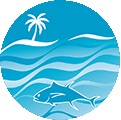Pacific Islands Forum Fisheries Agency

Logo of the Pacific Islands Forum Fisheries Agency
|
|
| Abbreviation | FFA |
|---|---|
| Formation | 9 August 1979 |
| Type | International organization |
| Purpose | Fisheries management |
| Headquarters | Honiara, Solomon Islands |
| Coordinates | 9°26′00″S 159°57′52″E / 9.433328°S 159.964478°ECoordinates: 9°26′00″S 159°57′52″E / 9.433328°S 159.964478°E |
|
Area served
|
Pacific Ocean |
|
Membership
|
17 state members |
|
Director General
|
James Movick |
| Website | www |
The Pacific Islands Forum Fisheries Agency (FFA) is an intergovernmental agency established in 1979 to facilitate regional co-operation and co-ordination on fisheries policies between its member states in order to achieve conservation and optimum utilisation of living marine resources, in particular highly migratory fish stocks, for the benefit of the peoples of the region, in particular the developing countries. Its office is in Honiara, Solomon Islands
The FFA was established by international treaty titled: South Pacific Forum Fisheries Agency Convention, signed by 14 states, mostly small island states in the Pacific Ocean plus Australia and New Zealand. Tokelau additionally joined the FFA membership in 2002. The FFA is based in Honiara, in the Solomon Islands.
The following Territory and States are FFA members:
The current Director General of FFA is James Movick (Federated States of Micronesia). Previous FFA Directors (the title was changed to Director-General in 2005) were:
Wez Norris (AU) is the current FFA Deputy Director-General. Previous Deputies were:
FFA assists its member governments and administrations in applying a coordinated and mutually beneficial approach to the conservation, management and development of regional tuna stocks. FFA has assisted its members in developing or negotiating a number of regional or sub-regional instruments for this purpose. These include:
As well as its policy coordination functions in tuna fisheries management and MCS (Monitoring, Control and Surveillance), the FFA Secretariat also has a substantial role in assisting its member countries in tuna fisheries development, including economic analysis, appraisal and promotion of investment opportunities, and in upgrading national standards that maintain access to major foreign markets. This latter work includes the establishment or updating of National Plans of Action to implement FAO standards, and the development of regionally-harmonised Catch Documentation Schemes and Port-based MCS measures for fish originating from Pacific Island SIDS waters.
...
Wikipedia
